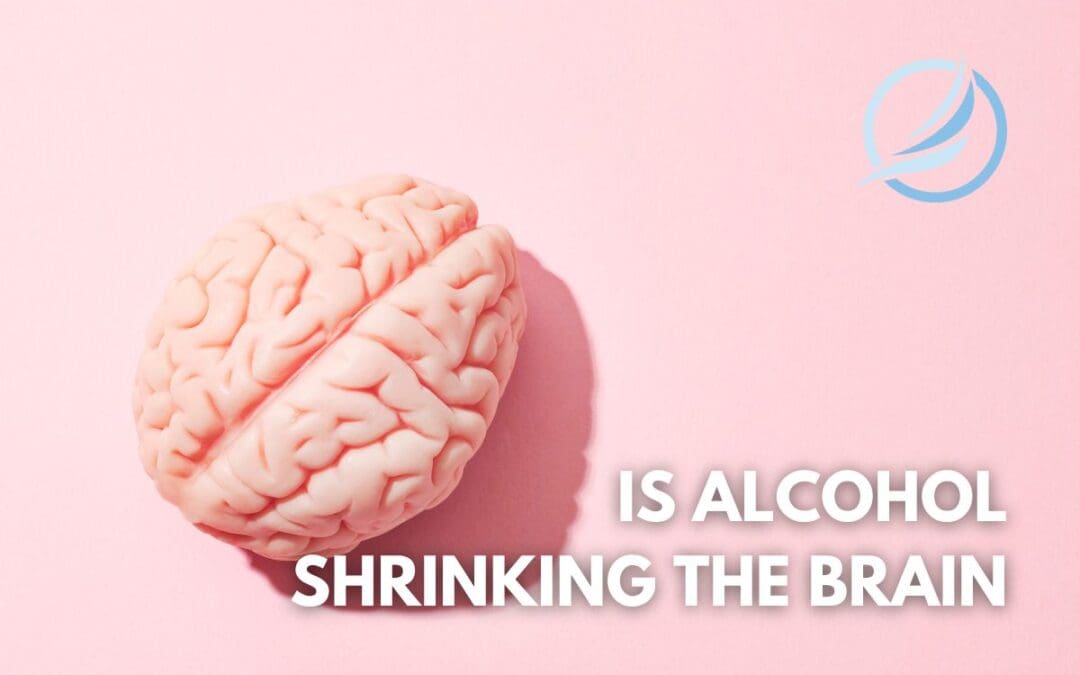We’ve all heard the saying that “a glass of wine a day is good for your heart.” But is it possible that the same glass of wine could be shrinking your brain? For years, moderate drinking has been seen as harmless or even beneficial, but emerging research suggests it may not be that simple. Even just one drink per day might have unintended consequences for your brain health.
Let’s explore the relationship between alcohol consumption and brain shrinkage to determine whether having a drink per day could shrink your brain over time.
What is Brain Shrinkage?
Brain shrinkage, or brain atrophy, occurs when neurons—the cells responsible for communication in the brain—die or lose connections.
Dead or disconnected neurons can lead to a loss of brain tissue, which affects cognitive functions like memory, decision-making, and general mental agility. While some brain shrinkage is a normal part of aging, abnormal shrinkage can lead to conditions like dementia and Alzheimer’s disease.
The main natural cause of brain shrinkage is aging, but lifestyle factors such as poor diet, lack of exercise, and excessive alcohol consumption can also play a role. Additionally, genetics and pre-existing conditions like high blood pressure or diabetes may further contribute to how quickly or severely the brain shrinks over time.
Does One Drink Per Day Shrink the Brain Over Time?
Medical research has shown that drinking has effects on brain structure and size. Particularly, there is an association between drinking and reduced gray and white matter across several areas of the brain.
Recent research has shed more light on this relationship. A 2022 study found that even low levels of alcohol consumption—about one drink per day—were linked to reductions in brain volume. The study analyzed data from over 36,000 adults and concluded that as alcohol intake increased, brain volume decreased, particularly in regions related to cognitive functions.
Furthermore, the study suggested that the relationship between alcohol consumption and brain volume is dose-dependent, meaning that the more alcohol consumed, the greater the reduction in brain volume. Researchers found that having four drinks a day has similar effects to aging ten years.
Reduced brain volume is often associated with cognitive decline. While the exact mechanisms aren’t fully understood, alcohol may contribute to neuroinflammation, oxidative stress, and disruption of the brain’s white matter, all of which can impair cognitive function over time.
Several other studies have suggested a link between even moderate alcohol consumption and adverse effects on brain health, including brain shrinkage and cognitive decline:
- A 2018 global study analyzed data from 195 countries and concluded that there is no safe level of alcohol consumption. The study found that alcohol is a significant risk factor for numerous health issues, including neurodegenerative diseases and brain damage.
- A 2017 study followed 550 middle-aged adults over 30 years and found that even moderate alcohol consumption (14–21 units per week) was associated with a threefold increased risk of hippocampal atrophy, a form of brain shrinkage linked to memory and spatial navigation.
- A 2012 study also highlighted that even in non-alcoholics, moderate drinking could lead to similar but less pronounced reductions in brain volume over time.
Should You Reconsider Your Drinking Habits?
While enjoying a daily drink might seem harmless, the evidence suggests that it could contribute to brain shrinkage and cognitive decline over time. So, should you reconsider your drinking habits? Here are a few factors to consider:
- Your Personal Risk Factors. If you have a family history of neurodegenerative diseases or mental health disorders or are prone to addiction, you might be more susceptible to the harmful effects of alcohol. Reducing or eliminating alcohol could be a proactive step in preserving your mental sharpness and overall well-being.
- Long-Term Brain Health. If maintaining cognitive function and protecting your brain from premature aging is important, it may be worth reevaluating how much and how often you drink.
- Overall Health. Beyond brain health, alcohol consumption is a risk factor for various other health issues, including liver disease, cardiovascular problems, and certain cancers. When considering whether to drink, weighing these potential risks against any perceived benefits is important.
Ultimately, the decision to reconsider your drinking habits is a personal one. However, being informed about the potential risks of even moderate alcohol consumption can help you make choices that align with your health goals.
One Drink Per Day Can Shrink the Brain, But You Can Prevent it
While enjoying a drink each day might seem like a small indulgence, the potential impact on your brain health is significant.
If cutting back on alcohol feels challenging, or if you’re unsure about how much is too much, seeking advice from a healthcare professional can be helpful. They can offer personalized recommendations based on your health history and lifestyle.
Reconsidering your drinking habits in light of the research could be a step toward safeguarding your cognitive function and overall quality of life. Making mindful choices about alcohol today could lead to a healthier brain tomorrow.





































